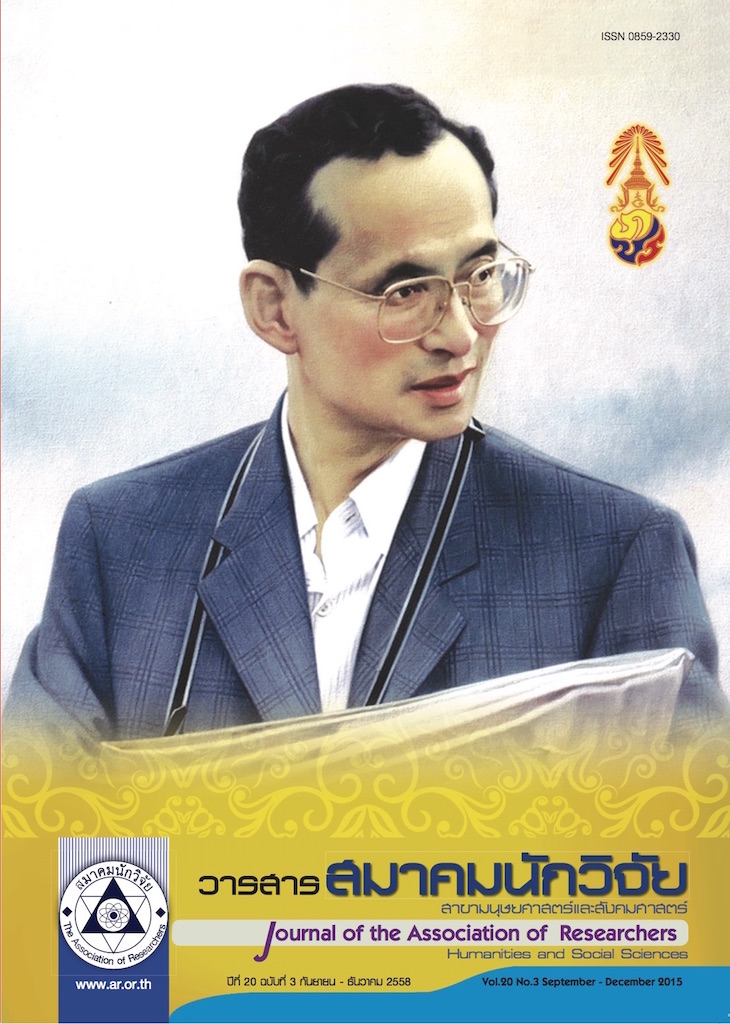Social Intelligence and Prosocial Behavior of Students of Faculty of Social Sciences at Kasetsart University
Main Article Content
Abstract
The objectives of this study were; 1) to study the level of social intelligence, and prosocial behavior of students of faculty of Social Sciences at Kasetsart University, 2) to compare prosocially
the behavior of students of faculty of Social Sciences at Kasetsart University by personal factors, and 3) to study relationships between social intelligence and prosocial behavior of students of faculty
of Social Sciences at Kasetsart University. The samples of this study were 616 students of the faculty of Social Sciences at Kasetsart University. The results of this study indicated that 1) social intelligence and prosocial behavior of students
of faculty of Social Sciences at Kasetsart University were at rather high levels, 2) students of faculty of Social Sciences at Kasetsart University who had various in gender and department had a difference
prosocial behavior with the statistical significant at .01and.05 levels respectively, and students of faculty of Social Sciences at Kasetsart University who had various academic levels, GPA, programs, income, activity participation, and birth order have not to difference prosocial behavior, 3) social
intelligence was positively correlated with prosocial behavior with the statistical signifcant at .001 level.
Article Details
บทความที่ปรากฏในวารสารนี้ เป็นความรับผิดชอบของผู้เขียน ซึ่งสมาคมนักวิจัยไม่จำเป็นต้องเห็นด้วยเสมอไป การนำเสนอผลงานวิจัยและบทความในวารสารนี้ไปเผยแพร่สามารถกระทำได้ โดยระบุแหล่งอ้างอิงจาก "วารสารสมาคมนักวิจัย"
References
มิราภา เต็งไตรรัตน์ และคณะ (2544), จิตวิทยาทั่วไป พิมพ์ครั้งที่ 3. กรุงเทพมหานคร มหาวิทยาลัยธรรมศาสตร์ ธีรพัฒน์ วงศ์คุ้มสิน (2558). การแนะแนวกับคุณภาพชีวิต: หน่วยที่ 8 ทักษะชีวิตกับการพัฒนาคุณภาพชีวิต นนทบุรี มหาวิทยาลัยสุโขทัยธรรมาธิราช
นพมาศ กุ้งพระ (2553). จิตวิทยาสังคม. กรุงเทพมหานคร: มหาวิทยาลัยธรรมศาสตร์ บุญธรรม กิจปรีดาบริสุทธิ์. (2547), ระเบียบวิธีการวิจัยทางสังคมศาสตร์, กรุงเทพมหานคร: จามจุรีโปรดักท์, บริษัท
แอดวานซ์ อินโฟร์เซอร์วิส จำกัด (มหาชน) ปาริชาต เทพอารักษ์ และ อมราวรรณ ทิวถนอม. (2550). “สุขภาวะของคนไทย จุดเริ่มต้นของความอยู่เย็นเป็นสุข.” วารสารเศรษฐกิจและสังคม 44 (1): 12-17 ประณต เค้าม. (2549). จิตวิทยาวัยรุ่น กรุงเทพฯ : ภาควิชาจิตวิทยา คณะมนุษยศาสตร์ มหาวิทยาลัยศรีนครินทรวิโรฒ วนิษาเรช. (2550) อัจฉริยะสร้างได้, กรุงเทพมหานคร: สำนักพิมพ์เรศ วัลลภา เทพหัสดิน ณ อยุธยา (2538), งานบุคลากรนิสิตนักศึกษา, กรุงเทพมหานคร, ภาควิชาอุดมศึกษา คณะครุศาสตร์
จุฬาลงกรณ์มหาวิทยาลัย
(2543). การพัฒนานิสิตนักศึกษา กรุงเทพมหานคระ ภาควิชาอุตมศึกษา คณะครุศาสตร์จุฬาลงกรณ์ มหาวิทยาลัย สำนักงานคณะกรรมการการอุดมศึกษา (2556). แผนพัฒนาการศึกษาระดับอุดมศึกษา ฉบับที่ 11 (พ.ศ. 2555-2559) กรุงเทพมหานคร, โรงพิมพ์แห่งจุฬาลงกรณ์มหาวิทยาลัย (2552) พระราชบัญญัติการศึกษาแห่งชาติ พ.ศ. 2542 แก้ไขเพิ่มเติม (ฉบับที่ 2) และ (ฉบับที่ 3) พ.ศ. 2553 กรุงเทพมหานคร: สำนักงานคณะกรรมการการศึกษาแห่งชาติ
อารี พันธ์มณี (2542) จิตวิทยาการเรียนการสอน.กรุงเทพมหานคร:บริษัท ต้นอ้อ 1999 จำกัด Albrecht, Karl.(2006). Social Intelligence The New Science of Success. San Francisco: Jossey-Bass A Wiley Imprint!
Baron, Robert A. N. R. Branscombe and D. Byre.(2008). Social Psychology.121 ed. United States:
Pearson.
Eisenberg, Nancy, E. Cameron and K. Tryon (1984). Development and Maintenance of Prosocial Behavior: International Perst ves on Positive Morality. New York: Plenum Press. Feldman, Kenneth Aand Theodore, M.N. (1970). The Impact of College Students.San Francisco: Jossey-Bass Inc.
Fiske, T. (2004). Social Beings Core Motives in Social Psychology, Princeton: Wiley& Sons, Inc. Gibbs, C. (2003). Moral Development and Reality. London: Sage Publications.
Goleman, Danial. (2006). Social Intelligence. London: Random House Group Limited. Kihlstrom. J.F. & Cantor, N. (2000). Social Intelligence in: Sternberg,RJ. (Ed.). Handbookof Intelligence. 214 ed. Cambridge: Cambridge University Press.
Komninos, Thalia. (2009). Prosocial Behavior as A Moderator of The Relationship between Spirituality and Subjective Well-Being. Doctor of Philosophy Thesis in Psychology, Fordham University. Meijs, N., Cillessen, Antonius, H. N., Scholte, RH., Segers, J.E., and Spijkerman, R. (2010). "Social intelligence and academic achievement as predictors of adolescent popularity" Journal Youth Acicolescence. Jar) ; 39(1); 62-72.


